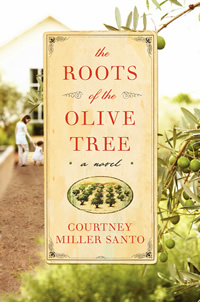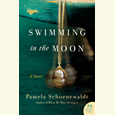All of Our Days
Courtney Miller Santo’s debut novel explores the complexities of mother/daughter relationships
In The Roots of the Olive Tree, Memphis novelist Courtney Miller Santo chronicles the complicated relationships between five generations of mothers and daughters in a California family with a special propensity for long lifespans. The book begins by introducing the feisty Keller family matriarch, 112-year-old Anna, still healthy and active despite her advanced years. Anna’s dream is to outlive the competition and claim the title of oldest person in the world: “she felt she was owed this distinction, due to the particular care she’d taken with the vessel God had given her,” Santo writes. “She didn’t say outright that God ought to strike dead that jo-fired man in China who was keeping her from the title, but after all these years, surely, God knew her heart.”
The family business is olives, and Anna lives in the house her father built adjacent to the olive grove he planted after the family emigrated from Australia in 1898. Living with Anna are her daughter, eighty-nine-year-old Bets, and her daughter, Callie, who is in her mid-sixties. As Anna walks the olive grove to glean the last of the harvest for her own use, she muses on her long life and her relationship with her father, Percy, a difficult man to love: “The noise the leaves made as she moved her hand quickly upward, the friction sending the fruit falling into the waiting basket, sounded like the voice of her father, who held as many stories as there were stars and each one always began and ended with the trees.”
 Anna is herself an eyewitness to a century’s worth of stories, including the time in 1900 when Percy and the other men of Kidron, California, decided to move the small town closer to the railroad line. Anna remembers the ropes and the teams of horses and how she collected broken bits and pieces (“a bit of bone from the butcher’s shop, three pearl buttons from the seamstress’s shop, and a watch fob from underneath the bank”) from the empty lots after the buildings were picked up and transported a mile away to a more economically advantageous location.
Anna is herself an eyewitness to a century’s worth of stories, including the time in 1900 when Percy and the other men of Kidron, California, decided to move the small town closer to the railroad line. Anna remembers the ropes and the teams of horses and how she collected broken bits and pieces (“a bit of bone from the butcher’s shop, three pearl buttons from the seamstress’s shop, and a watch fob from underneath the bank”) from the empty lots after the buildings were picked up and transported a mile away to a more economically advantageous location.
Anna’s advanced years have caught the attention of Dr. Amrit Hashmi, a geneticist from the University of Pittsburgh, who hopes to study her and her family as part of his quest to “unlock the keys to longevity that hid in the genes of certain people—superagers, they were called.” But on the day he is expected at the house to interview the women, Anna’s great-great-granddaughter, twenty-four-year-old Erin, arrives unexpectedly from Italy, where she has been performing as an opera singer. Anna, Bets, and Callie raised Erin from the age of four, after her mother, Callie’s daughter Deb, went to prison for killing Erin’s father. The strong-willed young woman soon reveals that she is pregnant by her married Italian lover and has come home to have the baby and to try to get her mother paroled after twenty years behind bars. Her appearance inspires Anna to observe that raising children is “less like molding clay and more like chipping away at granite with a butter knife.”
 Anna, Bets, and Callie decide to do whatever they can to see Erin through her pregnancy and to support her plan to help Deb, but despite their collaboration the subsequent months are not without conflict. Anna worries about what long-buried family secrets Dr. Hashmi’s research may reveal. Bets struggles to understand the increasingly close relationship between her dementia-afflicted husband Frank and his wheelchair-bound friend Guy at Golden Sunsets, the assisted-living facility where the two live. Callie agonizes over her olive-themed gift shop and tasting bar, The Pit Stop, where business is not exactly booming, and considers whether it might not be too late to fall in love. And they all wonder how life will change if the volatile Deb returns to the family. Erin wants her mother back, but she also wants to know why her mother killed her father. As for Deb—she longs to spend time with the daughter she could not raise and barely knows, but is afraid of life on the outside. And why do the Keller women live so long? Is it genetics or does the secret really lie in the olives?
Anna, Bets, and Callie decide to do whatever they can to see Erin through her pregnancy and to support her plan to help Deb, but despite their collaboration the subsequent months are not without conflict. Anna worries about what long-buried family secrets Dr. Hashmi’s research may reveal. Bets struggles to understand the increasingly close relationship between her dementia-afflicted husband Frank and his wheelchair-bound friend Guy at Golden Sunsets, the assisted-living facility where the two live. Callie agonizes over her olive-themed gift shop and tasting bar, The Pit Stop, where business is not exactly booming, and considers whether it might not be too late to fall in love. And they all wonder how life will change if the volatile Deb returns to the family. Erin wants her mother back, but she also wants to know why her mother killed her father. As for Deb—she longs to spend time with the daughter she could not raise and barely knows, but is afraid of life on the outside. And why do the Keller women live so long? Is it genetics or does the secret really lie in the olives?
According to an old proverb, “In the olive grove you’ve got to be wise in the feet and wild in the head.” As the five women—mothers and daughters—walk through the seasons of an entire year, Santo invites readers deep into their interior lives, revealing both their wisdom and their wildness. Relationships are mended but also broken and mourned, life is welcomed into the world as well as released from it, secrets are revealed, accepted, and put to rest. And what remains are the olive trees, whose gnarled and twisted branches grow and change through the years, adapting to wind and weather, and—just like family trees, if they are lucky—somehow managing to withstand the tests of time.
Courtney Miller Santo will discuss The Roots of the Olive Tree at The Booksellers at Laurelwood in Memphis on August 21 at 6 p.m. , at Parnassus Books in Nashville on August 22 at 6:30 p.m., and at the twenty-fourth annual Southern Festival of Books, held October 12-14 at Legislative Plaza in Nashville. All events are free and open to the public.


